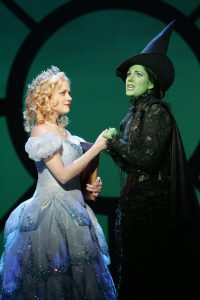by Maya Brown
As a musical freak and a feminist, I can’t help but notice how women are portrayed in modern day musicals. Although it would be exciting to see a man hit that high F, it’s just not the same. Musicals tend to market themselves towards women, and are therefore one of the places where women sometimes outnumber the men—and take a powerful step into the spotlight.
However, early musicals were very sexist and derogatory. They feature women strongly, but the women are mostly there for the men’s enjoyment. In South Pacific, the women are the nurses who surround the buff, macho men. In Oklahoma, the women are the love interests who need a man to keep them safe. The women in old, classic musicals are usually lovesick, stereotypical, and very feminine.
 Then there are the more raunchy musicals. While these have a tendency to show off women in short skirts and tops with massive amounts of cleavage, we actually start to see some improvement. Instead of the women’s sexual appeal, we get to see them as the main character in the stories. In Thoroughly Modern Mille, Millie is a woman in the roaring 20s who wants to give up love and make her own way in the world. She does end up falling for a man she meets, but the overall message is to be your own person. Both Annie and The Sound of Music also features very strong female leads that know what they want. Annie and Maria are rambunctious and stick to their guns—despite rough circumstances in their lives. Even Chicago, which may be more racy and corset clad, has the two main female characters resolve their differences and become friends in the end.
Then there are the more raunchy musicals. While these have a tendency to show off women in short skirts and tops with massive amounts of cleavage, we actually start to see some improvement. Instead of the women’s sexual appeal, we get to see them as the main character in the stories. In Thoroughly Modern Mille, Millie is a woman in the roaring 20s who wants to give up love and make her own way in the world. She does end up falling for a man she meets, but the overall message is to be your own person. Both Annie and The Sound of Music also features very strong female leads that know what they want. Annie and Maria are rambunctious and stick to their guns—despite rough circumstances in their lives. Even Chicago, which may be more racy and corset clad, has the two main female characters resolve their differences and become friends in the end.
The current musicals on Broadway have even a better message for women. Legally Blonde, a recent musical based on the movie, centers on Elle, a sorority girl. She follows her ex-boyfriend to Harvard Law School, only to realize she has a real passion for law, and ends up as one of the best in her class. This musical shows her breaking stereotypes and becoming a strong woman, even better than the movies do. Hairspray is another great new musical, which focuses on good body image. The characters are very believable and go against the grain—taking on race, cliques, and civil rights—all led by a spunky female lead character. Mamma Mia and The Color Purple are also great shows that center on positive relationships between women; a nice break from the catfights we see on reality TV.
While all these shows are great, Wicked is in a category all on it’s own. The show centers on the character Elphaba, the wicked witch of the west, who is constantly degraded because of her intelligence and her green skin. The story has a great moral about being yourself, and not caring about what anybody thinks of you. Throughout the story, Elphaba also becomes good friends with Glinda, the good witch of the North. It reminds us to look past society’s opinions and gossip and accept others. The overall message of the show is best summed up in a part of the song “Defying Gravity,” sung by Elphaba:“I’m through accepting limits/ ’Cause someone says they’re so/Some things I cannot change/But ‘till I try, I’ll never know!” How’s that for a girl positive song?!
Musicals have really come a long way since the 1950’s and it’s inspiring to see them making a comeback today. Mamma Mia and Hairspray are now popular movies, and Wicked has made a huge splash, even with people who aren’t of the musical seeing variety. Bravo! Oftentimes, powerful music expresses what words sometimes cannot. It’s also nice to see women portrayed in a better light. Finally. Now lets just hope other types of media follow Broadway’s lead.